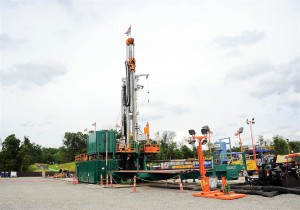From an Article by Anya Litvak, Pittsburgh Post Gazette, May 21, 2022
When the airport and the company now known as CNX Resources signed their Marcellus Shale gas agreement in 2013, there was the potential to drill as many as 45 wells on the campus of Pittsburgh International Airport. (But, only 14 have been drilled.) On Friday, the airport authority approved two new agreements with CNX that would incentivize more drilling, including in the deeper and drier Utica Shale layer.
Over the next five years, the airport will act as a marketing agent for CNX to secure customers for the gas that would come from yet-to-be drilled Utica wells. In order to be burned as airline fuel or in vehicles, that gas would need to be either compressed or liquefied — that is, cooled to a point where it turns into a liquid. That would also require the vehicles and/or plane engines to be retrofitted.
All of this will take time and money, Christina Cassotis, CEO of the Allegheny County Airport Authority, acknowledged. But she believes that with an increasing number of transportation and aviation companies pledging to reduce their carbon emissions, natural gas — which burns cleaner than diesel and gasoline — might be a short-term draw.
“Given the carbon commitments that are out there, how can we be part of helping the industry and airlines start to decarbonize immediately,” she said, invoking natural gas as a bridge fuel until cleaner fuels become available.
Both the airport authority and CNX framed this as a path to hydrogen — the subject of billions in federal funding and a focus of the natural gas industry, which envisions using its product to make hydrogen with the resulting carbon dioxide emissions captured and sequestered in a massive Appalachian storage hub.
CNX plans to build a liquefaction plant, according to spokesman Brian Aiello, with the timing yet to be determined. He also said it would produce a “naturally, not mechanically” compressed natural gas product, but the company declined to provide technical details, saying it’s proprietary.
In a fact sheet, the company referenced its “unique autonomous ultra-high-pressure separation technology, which performs consistently in harsh and high-pressure conditions, manages gas streams to be used to generate electricity and power — as well as hydrogen — in the immediate proximity of the wells.”
The timeline for adoption of natural gas derivates isn’t clear yet. Pittsburgh International will loop gas from CNX wells and solar power into its own microgrid, now in place.
“I think it depends on who’s asking, how motivated the engine manufacturers are,” Ms. Cassotis said. “Maybe it’s not an airline. Maybe it’s the snowplow.” She said the airport is looking at its own operations and evaluating ways to use more sustainable fuels. For example, it is pursuing a study of the potential to use organic waste to generate sustainable aviation fuel. “One thing at a time,” she said. “What the new agreement does is it puts some skin in the game for us — and it allows for a little bit of an additional royalty if we help” CNX sign up customers. Specifically, the airport stands to get up to 5% on the sale of any compressed or liquefied gas that it brokers, officials said.
The more immediate impact might come from revising the airport’s existing agreement with CNX — the one signed in 2014 that delivered a $46 million signing bonus and more than $57 million in royalties since the first Marcellus well went into production in 2016.
In exchange for a commitment from CNX to drill new wells, the airport authority has agreed to have post-production costs deducted from its royalties. Such costs include expenses incurred by CNX to get the gas from the wellhead to the point of sale. The airport authority’s original lease specifically prohibited deducting these costs from its 18% royalty, which Ms. Cassotis said has held CNX back from drilling additional wells.
The amended lease now allows for up to $1.60 for each million British thermal units to be withheld from its royalties. For context, the average price that CNX received for its gas last year was $2.57 per million Btu. The cost of gas has increased drastically in recent months. Eric Sprys, the airport’s CFO, estimated this would have the effect of slicing up to 45% from its royalty revenue. But Ms. Cassotis noted that a 45% cut is better than no new drilling and therefore, no new royalties. “We’re each getting something out of the deal,” she said.
According to CNX, the airport authority stands to add $24 million in Marcellus royalties and up to $27 million in Utica royalties by 2030 as a result of these agreements. CNX gas already powers a microgrid at Pittsburgh International Airport, which also includes a solar panel installation.
#######+++++++#######+++++++########
See Also: Special Focus: Well Completion Technology ~ “Using data from drilling to guide completion designs,” Kevin Wutherich (Drill2Frac), World Oil, Volume 343, No. 5, May 2022.
Existing but previously unused data obtained during the drilling process can now be used to enhance completion design. The author outlines the available data and discusses how it can be incorporated into the completion design process and ultimately provide economic benefits to an operator.


{ 1 comment… read it below or add one }
Re: Using data from drilling to guide completion designs
This is all good for the drilling. What about other concerns. Climate, people that live near, surface vegetation? This is an example of looking at part of the problem, not all of it.